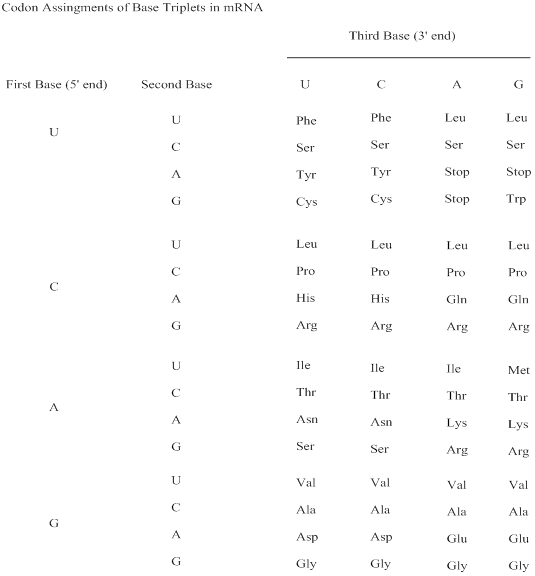
Concept explainers
Interpretation:
The possible amino acid for GAG code and other codes for the same amino acid has to be predicted.
Concept Introduction:
Codon: A sequence of three ribonucleotides in the mRNA chain that codes for a specific amino acid; also a three-
Genetic code: The sequence of nucleotides, coded in triplets (codons) in mRNA that determines the sequence of amino acids in protein synthesis.

Illustrated relationships are:
DNA informational strand: 5’ ATG CCA GTA GGC CAC TTG TCA 3’
DNA Template strand: 3’ TAC GGT CAT CCG GTG AAC AGT 5’
mRNA: 5’ AUG CCA GUA GGC CAC UUG UCA 3’
protein: Met Pro Val Gly His Leu Ser
Notice: 5’ end of the mRNA strand codes for the N-terminal amino acid, whereas the 3’ end of the mRNA strand codes for the C-terminal amino acid. Proteins are always written N-terminal to C-terminal, reading left to right.
Want to see the full answer?
Check out a sample textbook solution
Chapter 26 Solutions
Fundamentals Of General, Organic And Biological Chemistry In Si Units
- State the DNA sequence that encodes the anticodon that recognizes the codon AAG, with 5’ and 3’ ends labeled.arrow_forwardA tRNA that has the anticodon GAG carries which amino acid?arrow_forwardExplain the steps of RNA translation into protein. Mutations: The codon GGA encodes the amino acid glycine. Identify the type of mutation for each of the following changes (name both the type of mutation and what the new codon would produce): GGA to GGG GGA to UGA GGA to GAGA GGA to AGAarrow_forward
- Given the following mRNA sequence: 5-AUCCCGUAUGCCCGGGAGCUAGCCCAGC-3 a) Label the first condon, the stop codon, the untranslated regions and predict the amino acid sequence of the polypeptidarrow_forwardlist the amino acid sequence that would be made in a ribosome using these codons: AUG CUA AGU UUG UGU ACC GAG UAAarrow_forwardTranslate the following mRNA into protein, starting from the first initiation codon: 5'-CCGAUGCCAUGGCAGCUCGGUGUUAC AAGGCUUGCAUCAGUACCAGUUUGAAUCC-3'arrow_forward
- A. What amino acid sequence is encoded by the codon sequence AUAAUGGUAACGGUU? B. Suppose the codon sequence AGACACUCUAUUAAA has a single base pair mutation to AGACACUCUUUUAAA. If the old protein sequence was Arg-His-Ser-Ile-Lys, what will be the new sequence encoded by the mutant gene?arrow_forwardWhat amino acid sequence is encoded by the codon sequence ACGCAGCGCCCGGUC? Use the 3 letter abbreviation with hyphens and no spaces in between.arrow_forwardWhat are the amino acid coded for each of these codons? 1. UUA 2. AUU 3. UGU 4. AAA 5. GAG 6. UAAarrow_forward
- An mRNA has the following base sequence:5′–CAGGCGGCGAUGGACAAUAAAGCGGGCCUGUAAGC–3′Identify the start codon, and determine the complete amino acid sequence that will be translated from this mRNA.arrow_forwardIf the mRNA transcribed for this gene will be translated into a functional protein, how many amino acids will be used to build the polypeptide chain? what is the amino acid coded by the 25th codon? what is the amino acid coded by the last codon?arrow_forwardSuppose the codon sequence GUGCAAUUCGAGGCC has a single base pair mutation to GUGCAAUUCAAGGCC. If the old protein sequence was Val-Gln-Phe-Glu-Ala, what will be the new sequence encoded by the mutant gene? ____________________________.arrow_forward
 Human Heredity: Principles and Issues (MindTap Co...BiologyISBN:9781305251052Author:Michael CummingsPublisher:Cengage Learning
Human Heredity: Principles and Issues (MindTap Co...BiologyISBN:9781305251052Author:Michael CummingsPublisher:Cengage Learning Biology (MindTap Course List)BiologyISBN:9781337392938Author:Eldra Solomon, Charles Martin, Diana W. Martin, Linda R. BergPublisher:Cengage Learning
Biology (MindTap Course List)BiologyISBN:9781337392938Author:Eldra Solomon, Charles Martin, Diana W. Martin, Linda R. BergPublisher:Cengage Learning Biology Today and Tomorrow without Physiology (Mi...BiologyISBN:9781305117396Author:Cecie Starr, Christine Evers, Lisa StarrPublisher:Cengage Learning
Biology Today and Tomorrow without Physiology (Mi...BiologyISBN:9781305117396Author:Cecie Starr, Christine Evers, Lisa StarrPublisher:Cengage Learning BiochemistryBiochemistryISBN:9781305577206Author:Reginald H. Garrett, Charles M. GrishamPublisher:Cengage Learning
BiochemistryBiochemistryISBN:9781305577206Author:Reginald H. Garrett, Charles M. GrishamPublisher:Cengage Learning



